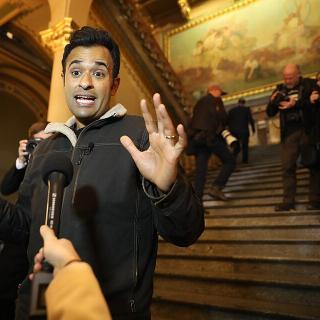Advertisement
This article first appeared in the Buckeye Flame
After more than three years and hearing hundreds of witnesses at the Ohio Statehouse, lawmakers have passed legislation that bans healthcare for transgender youth and prevents transgender girls from competing in sports from kindergarten through college.
After receiving a favorable report from the Senate Government Oversight Committee during its fourth hearing, an amended version of Ohio House Bill (HB) 68 passed 24 to 8 during a full Senate vote Wednesday afternoon.
Wednesday evening, the Ohio House voted 61 to 27 to concur, endorsing the Senate’s amended bill and sending it to Ohio Gov. Mike DeWine for his signature.
Dubbed the “Save Adolescents from Experimentation (SAFE) Act” by its primary sponsor, Baptist pastor and state Rep. Gary Click (R-Vickery), the bill directly rejects the general medical consensus of every major healthcare authority and association in the world.
Despite objections from Democrat lawmakers noting that “transgender people will die” under HB 68 — and hours-long protests that reverberated throughout the Statehouse — Republicans celebrated the sought-after win.
Lawmakers reject global medical consensus
Earlier this week at a Senate hearing, Nick Lashutka, president and CEO of the Ohio Children’s Hospital Association (OCHA), strongly opposed the bill on behalf of the statewide coalition of pediatric hospitals.
“HB 68 creates broad, sweeping barriers for access to mental health care without justification,” he said. “This is a small, but extremely vulnerable and high-risk population. Our hospitals have devoted, multidisciplinary teams of specialists to support their well-being. We are deeply concerned about what will happen to these kids should HB 68 become law.”
Conservative lawmakers proposed a last-minute amendment to the bill, and appeared to address a list of requests and concerns outlined in Lashutka’s written testimony.
According to a summary of the amendment provided by research analyst Emma Carroll, the senate amendment to HB 68 will:
- “Permit a physician to continue to prescribe cross-sex hormones or puberty-blocking drugs to a minor after the bill’s effective date under specified circumstances.”
- “Require a mental health professional, before diagnosing or treating a minor’s gender-related conditions, to obtain the consent of at least one parent or legal custodian, or minor’s guardian (instead of each residential parent and legal custodian or guardian.)”
- “Remove the definition of ‘gender’ from the bill.”
- “Remove the reference in the legislative findings to American Psychiatric Association data regarding the percentage of the American population that experiences distress at identifying with their biological sex.”
- “Remove a section delaying the bill’s provisions for six months.”
As a result of the final stipulation listed in the senate amendment, HB 68 will take effect immediately if signed by Gov. DeWine.
HB 68 will:
- “[Prohibit] a physician from knowingly performing gender reassignment surgery” — which is not permitted in Ohio’s children’s hospital — and from “knowingly providing” hormone replacement therapy drugs to transgender patients who are under age 18.
- “[Establish] penalties for physicians and mental health professionals who engage in conduct the bill prohibits.”
- “[Prohibit] a physician from aiding or abetting those prohibited practices.”
- “[Require] that prior to a mental health professional diagnosing or treating a minor for gender-related conditions, they must obtain parental consent and screen the minor for other comorbidities, abuse and trauma.”
- Prevent Medicaid from offering coverage for gender-affirming healthcare for minors, though Medicaid may still be permitted to cover limited mental health services for transgender people.
- Prevent the court from removing a transgender child from a parent or guardian’s custody in the event that they reject the transgender child and deny them access to healthcare.
Roegner also clarified that HB 68 bans puberty blockers and hormone replacement therapies exclusively for transgender youth, and that cisgender youth are still legally permitted to receive gender-affirming healthcare.
In addition to banning healthcare for transgender youth, HB 68 was amended to include House Bill 6, the “Save Women’s Sports Act,” which bans transgender girls from competing in sports from kindergarten through college, including both public and private institutions.
In addition, the bill also allows specific legal action around the policy:
- “[Authorizes] an athletic participant may file a civil action for injunctive relief, damages and any other relief available, if the participant is deprived of an athletic opportunity or suffers a direct or indirect harm as a result of a violation of the bill’s single-sex participation requirements.”
- “Prohibits a state agency or political subdivision, accrediting organization or athletic association that operates or has business activities in Ohio from taking adverse action against a school, school district, or college or university that complies with the bill’s single-sex participation requirements.”
Anti-LGBTQ+ hate groups tied to legislation
Currently, there are more than 589 pieces of active anti-transgender legislation across the country.
Much of that legislation — including HB 68 — is based directly on model legislation drafted by two powerful designated anti-LGBTQ+ hate groups: the Alliance Defending Freedom (ADF) and the Family Research Council (FRC).
The wealthy, evangelical think-tank and powerful Christian nationalist group has played a massive role in the national uptick in anti-transgender legislation, along with Ohio-based Christian nationalist lobbying group the Center for Christian Virtue (CCV) — which was classified as an anti-LGBTQ+ hate group between 2015 and 2017.
To help pass the bill, conservative lawmakers have worked closely with CCV, including Ohio Senate Government Oversight Committee Chair Sen. Kristina Roegner (R, District 27) — who has apparent ties to the formerly designated anti-LGBTQ+ hate group, reposting anti-transgender content from the group via her account on the social media platform X, formerly known as Twitter.
What happens next?
HB 68 next heads to the desk of Gov. Mike DeWine for his signature
DeWine has 10 days to approve or reject the bill, parts of which he has previously opposed.
If DeWine signs the bill into law, it will be illegal for doctors, licensed therapists, counselors and social workers to provide transgender people under the age of 18 with any type of healthcare considered “gender-affirming,” including some types of family counseling and talk therapy.
It will also be illegal for transgender girls to compete in sports from kindergarten through college, despite the Ohio High School Athletic Association (OHSAA)‘s criticism of the bill.
The OHSAA already regulates competitive high school sports based on a set of carefully crafted fairness standards for Ohio’s student athletes. OHSAA president Doug Ute submitted written submitted written testimony in opposition to the bill.
Gov. DeWine has previously stated that he does not believe that the legislature should pass a blanket ban on transgender athletes, telling reporters that such legislation “is best addressed outside of government.”
Wednesday evening, he told reporters he was aware the legislation may arrive at his desk soon, but that he had not yet made a decision regarding the bill.
LGBTQ+ advocates are urging the governor to stick to his word:
“We will call upon the governor to stand by what he said, to believe in Ohio regulatory bodies and to allow them to do the good work they are already doing in our state,” said Siobhan Boyd-Nelson of Equality Ohio.
IGNITE ACTION
If you are a young person struggling, contact the Trevor Project 866-4-U-Trevor — Adults contact the National Trans Lifeline: 877-565-8860
To access a webform created by the ACLU of Ohio urging Governor DeWine to veto HB 68, click here.


